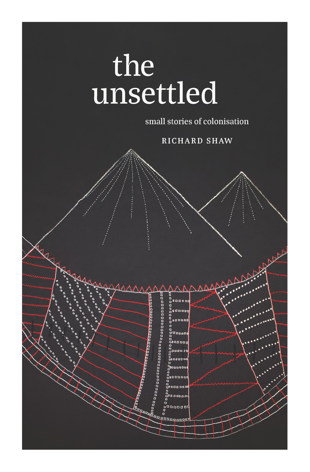Rowan Light reviews The Unsettled: Small stories of colonisation by Richard Shaw:
‘Aotearoa New Zealand, like the Arthurian setting of Kazuo Ishiguro’s The Buried Giant, is a landscape with its own buried giants of memory, myth and a contested past. Ishiguro’s titular monster is a metaphor for a past that is so violent and full of anguish that it has been collectively buried by a fiction (that Arthur’s reign was one of universally accepted peace rather than genocide) and guarded by a dragon whose magic causes communities to forget their memories.
In our own public life, greater attention has been drawn to the events of colonial conflict—‘the New Zealand wars’—which, despite their impact on the balance of political, economic and cultural power today, have only recently been recognised in national curriculum and commemoration. For many New Zealanders, it is a buried truth that the wars were of apocalyptic proportions for iwi Māori, of which Pākehā today are the primary benefactors. We can point to how this violent past has been shrouded in myth and forgetting. Few New Zealanders can hold, untroubled, once-cherished myths of peaceful settlement and perfect race relations through the Treaty of Waitangi. Yet Michael Belgrave observes that ‘we seem to be remembering [the wars] at every opportunity, and then forgetting about them everyplace in between’. Such is the enchantment of our public amnesia.
Like the protagonists of Ishiguro’s novel, we too are faced with choices that need immense care and consideration amidst calls for the reappraisal of the past in public life. Ignoring past hurt is no longer viable. Others would seek to control it. David Seymour’s desire to legislate the principles of the Treaty of Waitangi is one such flawed project: a strange recognition of a waking giant, a past that demands to be grappled with. At the same time, in summoning collective experiences from the traumatic past, carried out in performances of memorialisation and commemorative acts, remembering can lead to conflict and the maintenance of grievance and victimisation. Anyone seeking to unbury the violent past, however well-intentioned, needs to recognise this.
The fraught demands of remembering—to wake the buried giant or let it lie—are what Richard Shaw explores in The Unsettled. In the intervening years since his 2021 memoir The Forgotten Coast, Shaw has been part of a series of conversations (as well as the target of criticism and outright abuse), in person and through correspondence, with a range of Pākehā New Zealanders. (It is an explicitly Pākehā perspective: ‘us’ and ‘my/our people’ throughout the book are Pākehā.). Some are like-minded; others are ‘fretful sleepers’ and ‘broken-souled people’—but all share, in some way, long settler histories riddled with phantoms and skeletons (p. 133). Through a kind of dialogical writing, Shaw reflects on how Pākehā might ‘live well with their own pasts, presents, and futures’.
I’m interested in this, in how we react when our sleep is disturbed. For some—including those whose stories are in this book—there is a pull, a need to apprehend both the nature of our historical foundations and how to live well on them. But those who’ve sent me abusive messages, and many of those opposing the Ōtorohanga students’ petitions, have resorted to anger, unsettled, perhaps, by what lies just beneath the surface. (p. 131)
This is the ethics of a Pākehā memory. What Pākehā remember (and forget) of their past constitutes their sense of belonging and identity. Moreover, this knowing or ‘unknowing’ has been a key part of their assertion of and response to colonial power since the nineteenth century. The question posed by Shaw is whether a Pākehā memory can only ever reinforce their position within a colonial order or be exercised in an ethical way that supports Māori in a shared, flourishing future. Hence, Shaw and his interlocutors are the ‘unsettled’, but ‘they are doing something about it’.
It is a timely piece of writing, sitting across some of the big debates of the last decade firing up in new ways in 2024. Shaw offers a series of chapters to be read less as a clearly developed argument and more akin to Pascal’s pensées: ‘small stories’, of tragic ‘unsaid, difficult things’ that ‘we glimpse out of the corners of our eyes but do not fully apprehend: things that are hinted at and which make us uneasy’ (p. 29). In between historical truth and fiction are the conversations among families, through which the past is distilled, ordered, forgotten and survived. A major source of unease is the origin of land, ‘the family farm’, that fundamental unit of pioneering myths, along with ‘the survey pegs, the fence line, the boundary markers’, which furnish our storied past and obscure its malignancy. The task here is to connect these ‘small stories’ to the big histories—of the legal, political and military processes of state forming, neither of which is possible without the other—‘they represent a continuum, not a binary’ (p. 29).
Broadly, The Forgotten Coast and now The Unsettled are ‘critical family histories’ that explore the ‘why’ of family origins rather than simply the ‘what’ (p. 29). New Māori history, notably Rachel Buchanan’s history of Taranaki Māori experiences of conquest and raupatu, has also shaped Shaw’s project—highlighting not simply the economic benefits of the colonial system, but also its cultural axis, of memory and belonging. Shaw is also responding to Pākehā backlash to public changes in our memory culture—such as the introduction of the New Zealand Wars day of commemoration (an example of ‘how to forget’ in Chapter 4). Submissions to the select committee offered a rare window into how at least a subset of the Pākehā population thinks and talks about the past.’
Read the rest of the review here.


